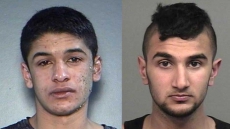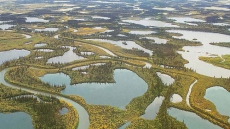VANCOUVER — Biomechanical engineer Alyssa DeMarco is distressed whenever she spots two nearly identical snow-sport helmets — with a subtle difference that could be life shattering.
Superior helmets are certified by an international standards organization, but in Canada there's no law on safety regulations for ski or snowboard headgear.
Imposter helmets are a big concern as Canadians prepare up for another winter sport season, said DeMarco, who leads the helmet-research team at MEA Forensic, a collision and injury reconstruction firm in Vancouver.
British Columbia coroner Timothy Wiles joined the perennial debate over helmet laws earlier this year, calling for their use to be mandatory.
Wiles wrote in a report into the November 2013 death of a 16-year-old snowboarder who suffered a traumatic brain injury that helmets may significantly reduce injury and mortality rates.
But in a snow-sports culture that has now vastly accepted helmets, it's the danger of substandard products that worries DeMarco.
She's seen inadequate helmets at the Whistler Blackcomb ski resort many times and said it's hard for consumers to tell the difference.
"They're the same price, the same look, similar boxes," DeMarco said. "You could very easily get confused and end up buying a hard-hat helmet, which is lacking what makes a helmet a helmet."
The major distinction is an energy-absorbing liner, she said, adding the deficiency would not exist if the federal government required only certified helmets to be sold.
Canada crafted its own regulation in 2008, under the Canadian Standards Association, but it's already outdated, DeMarco said. Policy-makers could instead turn to international standards developed in the United States and Europe, she recommended, primarily with the "ASTM 2040" or "CE" marking.
The mere use of helmets is no longer an issue, said David Lynn, president of the Canada West Ski Area Association.
He said on-mountain surveys of skiers and boarders show that helmet use skyrocketed from 32 per cent in 2003 to 86 per cent in 2015 and that it continues to climb.
The association encourages its members to sell only helmets conforming to existing international standards and said it would support such legislation.
"If it's a low-cost helmet and people buy it and they assume it meets some kind of standard, they're potentially exposed to a higher level of risk," Lynn said.
At Whistler Blackcomb, a policy making helmets mandatory was introduced about a decade ago for its highest-level terrain park. Staff enforce the rule, said spokeswoman Lauren Everest, but the guideline doesn't distinguish between headgear.
Liberal candidate Hedy Fry, who represents a Vancouver riding, has made two unsuccessful bids since 2007 to introduce snow-sport helmet legislation.
If re-elected, Fry said she will push again for helmets to require certification before they're approved for sale, import, or advertisement — either through legislation or an order-in-council.
Fry's bills were supported by Brain Injury Canada, the Alzheimer Society of Canada, the Insurance Bureau of Canada and the Canadian Medical Association — "who all call it a no-brainer," she said.
Blaine Hoshizaki, director of the Neurotrauma Impact Science Laboratory at the University of Ottawa, said advances in helmet safety to prevent concussions, for example, are being made.
But that almost doesn't matter because manufacturers are not required to adopt safety standards, he said.
"Can there be better helmets? Yes. Has the technology moved forward? Yes. But Canada is not in that discussion."
Regardless of innovations, helmets still have limitations, said Prof. emeritus Jasper Shealy, with the Rochester Institute of Technology. He has been researching ski-related injuries for more than four decades.
Not even the most advanced helmet is likely to save a life if someone slams into a tree or rock, Shealy said.
"You're going to need a lot more than anything the market can possibly provide."




